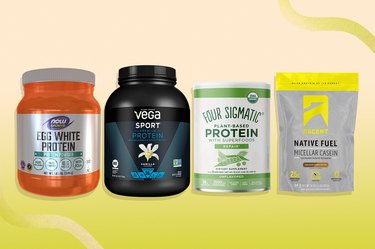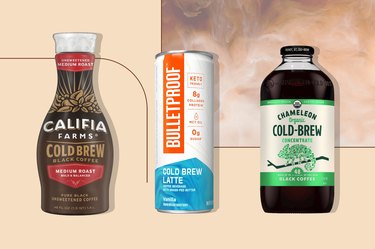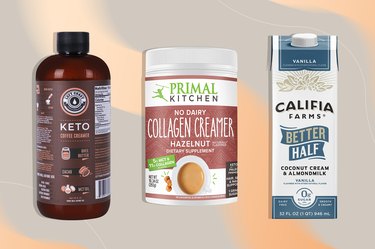
You might've already sacked the sugar and artificial creamers in your coffee. But what if we told you that adding something could enhance the nutritional value of your brew?
Yep, stir a scoop of collagen powder into your next coffee for a boost of health benefits.
Video of the Day
Video of the Day
Collagen is a type of protein that's found in your skin, nails, hair and bones. Emerging research points to its positive effect on gut health, cartilage, joints and wound healing, says Holley Samuel, RD, CPT, owner of Fit Cookie Nutrition. In fact, collagen can help increase skin elasticity and improve its appearance, per New York-Presbyterian.
Tip
“Various brands offer different types of collagen and therefore different benefits. But one of the most important things studies show is that the quality of the supplement matters,” Samuel says. “As a dietitian, I recommend looking for grass-fed or pasture-raised sources of collagen from brands with superior quality standards.”
Try these collagen products:
How Much Collagen Should You Add to a Cup of Coffee?
"Most brands include their own scoopers within and, generally, the portion size is one or two scoops," says Bonnie Taub-Dix, RDN, author of Read It Before You Eat It: Taking You from Label to Table.
Start off with a half scoop or one tablespoon of collagen and see if you like it. Then, experiment with adding a full scoop.
Will Collagen Alter Your Coffee’s Flavor?
If you don't want to mess with your cup of joe's flavor, pick a plain, unflavored variety of collagen.
What's more, you'll also want to choose a quality, fully hydrolyzed collagen (more on that later) — which should not alter the taste of your coffee, Samuel says.
But some brands offer flavored varieties as well. If you go this route, just be mindful of artificial flavors and added sugar.
Tip
To make sure your collagen powder seamlessly mixes with your coffee, Samuel recommends using a milk frother ($10, Amazon).
Does Heat Denature the Proteins in Collagen?
Likely not. Researchers exposed collagen proteins to temperatures of 302 to 788 degrees Fahrenheit and found that the proteins' initial degradation occurred at around 527 degrees F, per a July 2011 Biophysical Journal study.
Coffee is usually brewed at under 200 degrees F, so the proteins' structure probably remains intact as your coffee won't be hot enough to cause that degradation process, Taub-Dix says.
Still, keep in mind that coffee itself may affect your body's own ability to produce collagen. Indeed, caffeine intake is linked to reducing collagen synthesis in human skin cells, per an October 2014 study in Drug Design, Development and Therapy; but, more research needs to be done to confirm these findings.
So, here's the takeaway: "Caffeine is OK in moderation, and adding collagen to your hot caffeinated beverage may provide benefits, but more research is needed," Samuel says.
Can You Add Collagen to Cold Coffee, Too?
If you're a cold brew fan, you're probably wondering whether you can mix collagen with your iced coffee. Yes, certain types of collagen — such as fully hydrolyzed varieties — can also be added to cold drinks, Samuel says.
"Fully hydrolyzed collagen is more bioavailable (meaning, we can absorb and use it more readily in our bodies) and dissolves easily into hot or cold beverages."
Conversely, "partially hydrolyzed collagen, known as gelatin, is only soluble in hot beverages," Samuel adds.
Another thing to note: "There seems to be the trend of adding butter or MCT oil to your coffee and collagen mix, but more studies are needed to determine whether that addition has any impact on absorption," Taub-Dix says.
Tip
“Collagen is best absorbed with vitamin C, and while some brands do include a vitamin C source within their collagen powder formulas, some do not,” Samuel says. For maximal absorption, pair your collagen coffee with vitamin C-rich foods like berries or citrus.


